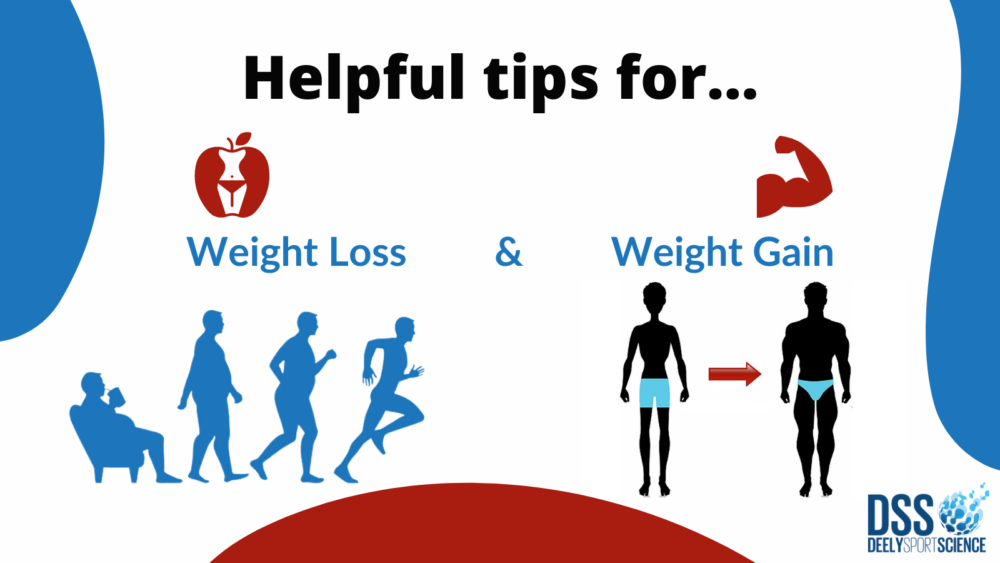
14 Jan Helpful Tips For Weight Loss & Weight Gain by John Murphy PhD(c)
Helpful Tips For Weight Loss & Weight Gain
by John Murphy PhD(c)
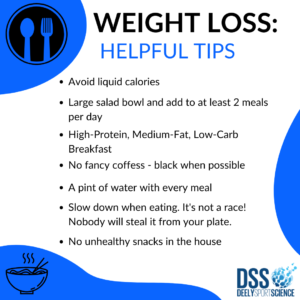
January is a common time for people to make a commitment to changing body shape. Most focus on some big elaborate plan that is not sustainable in the long term, while others focus too much attention on one minor detail that has limited (if any) benefits. Below is a list of helpful tips that you can implement whether you’re looking to shed some weight before returning to pre-season or you’re trying to pack on a bit of muscle in anticipation of championship 2021.
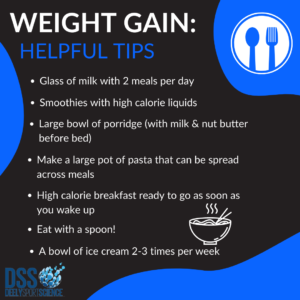
Weight Loss
Before digging into the tips, it’s worth understanding that they key to weight loss is ensuring we’re consuming less calories than we burn throughout the day on a consistent basis. There are no magic weight-loss foods and the key is focusing on behaviours that will help us remain feeling full after meals and fuelled for training sessions. Trying to use exercise to create the energy deficit is also doomed to failure in the long term. Use exercise for the fitness and health benefits, then adjust diet based on your fuel needs.
Avoid Liquid Calories
Liquid calories include juices, alcohol, smoothies, shakes and soft drinks. While smoothies contain plenty of micronutrients, they’re also packed with calories (energy). Liquids don’t leave us feeling as full as traditional solid foods, mainly due to how quickly they’re digested. Hunger signals appear much sooner than after a solid meal and so we’re more likely to eat more throughout the day.
Large Salad Bowls
At least half your plate should be covered in vegetables. One of the simplest ways to help this is to buy a few pre-made salad bowls and add a large fistful to at least two meals per day. Bags of spinach work the same. The salad will fill your stomach and take longer to digest and therefore leave you feeling fuller for longer. The additional fibre in your diet will also help your digestive system. Trial a few different types of salad and find the one that you enjoy the most. Salads include spinach, rocket, round or iceberg lettuce but do not include coleslaw or spuds in mayonnaise!
10,000 Steps A Day
This is a non-negotiable minimum every day. The benefits of walking are vastly under-reported, especially for those who play sport. Reaching a minimum of 10,000 steps per day ties in a lot of other health behaviours, such as fresh air, a break from work, less-screen time, etc., It’s also far less tough on the body, and way more sustainable than trying to go for a run every day. To help build extra steps into your day, find an interesting podcast or audiobook you want to consume and save it for your daily walks. Also, try to save phone calls for when you can go for a walk in a reasonably quiet place.
Protein Based Breakfast
We spoke before about the importance of protein at breakfast in terms of muscle recovery, but it’s also a very helpful behaviour for weight loss. Protein leaves us feeling fuller for longer and usually requires some form of food prep which is an excellent habit to develop. Simple steps like boiling two eggs the night before or mixing protein powder with chia seeds, fruit and 0% Greek yoghurt can be done in advance and breakfast is ready to go. If you’ve a bit more time on weekends then experiment with omelettes; turkey sausages and bacon medallions; or low-carb protein pancakes.
No Fancy Coffees
This ties in with the liquid calories point, but the fancy coffees can contain so many unexpected calories through sugar, cream, flavourings, etc., Enjoying the taste of black coffee, or just adding a small drop of milk will help you appreciate the taste. Alternatively, you can try some green teas like peppermint throughout the day or camomile as you near bed time. Flavour drops can also help as you try to give up the traditional flavoured coffees.
A Pint Of Water With Every Main Meal
Apart from the hydration benefits, a pint of water will help fill your stomach as you eat and decrease the chances of overeating. When having the pint of water, concentrate on tasting and chewing your food. Try not to wolf the water down as you’re chewing but wait until it’s fully gone from your mouth.
Low Calorie Spices & Sauces
Eating boiled chicken can be incredibly boring and is very difficult to sustain for more than one meal. Adding some interesting flavours to our dinners can encourage us to eat healthier, leaner and more satiating foods. Many of these flavourings, especially those in jars and sachets can be incredibly calorific. Alternatives include jars of chilli powder, garlic powder, Frank’s Hot sauce, Lidl or Aldi’s Piri-Piri sauce, and low kcal cooking spray. These will add plenty of flavour to meats, fish, salads and stir fries while still keeping calories low.
No Unhealthy Snacks In The House
If you’re concerned about eating crisps, chocolate or biscuits while at home, then don’t keep them in the house. It may feel like you need to have them for visitors but it’s most likely that visitors are there to see you and not your treat press or biscuit tin. If you would like a “treat” at some stage during the week then have just the right amount that’s required and no more. Deals on multipacks of bars may seem like you’re getting a great bargain but realistically it’s saving you a few a euro or two at most while negatively impact your goals and long-term health.
Slow Down When Eating
It’s not a race against the other people at the table. It’s very unlikely you’re one of 12 siblings and anything not eaten within 30 seconds will be taken by them. Enjoy the taste of your food, chew it fully and don’t fill your fork again until your mouth is empty.
Get Through The First Weekend
When starting a new regime, it’s always easy to start on Monday and fly it until Thursday. The weekend is the real challenge when things often go wrong followed by starting all over again on Monday or throwing your hat at it. Ensuring you get through that first weekend leads to putting at least 10 good days together and instils loads of good habits to help stay on top of things. Planning a food shop for Friday and trialling a new healthy recipe can be a big help in getting through that first weekend.
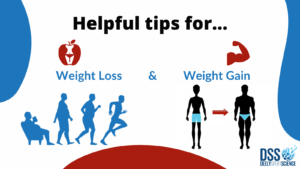
Weight Gain
As mentioned above, consuming more calories than you burn is key when gaining weight. It’s also important to note that without some form of stimulus, mainly through resistance training, any weight gain will likely be excess fat. Below are some tips to help you consume extra calories without too much hardship or feeling you’ve constantly overeaten.
Glass Of Milk
Most public health guidelines recommend we choose low-fat milk instead of full-fat. This is mainly due to the extra calories. As we want to consume more, the full-fat version will provide these through a combination of carbohydrate, protein and fat. Having a glass of milk with at least two main meals is a simple (and cost effective) way to get more calories in without feeling too full.
Smoothies
Again as mentioned above, smoothies contain loads of calories. These can also be increased by adding nut butter, juices and porridge oats. Adding a smoothie as a midday snack, as a side to your breakfast or as pre-bed can help you get in loads of extra calories while not impacting your main meals.
Porridge Toppings
You can double (or even triple) the calories in a bowl of porridge by swapping water for milk, adding a scoop of protein, and topping with chia, linseed, peanut butter and a chopped banana. It will add about 1 minute extra in terms of calories and up to 400 calories. This can be had for breakfast or as a pre-bed snack.
Pot Of Pasta
Pasta is cheap and really hard to mess up when cooking (although I’ve seen it done). Filling a pot with pasta, flavouring with some tomato based sauce and adding to your lunch and dinner is a very simple way to add extra carbohydrate to your day.
High Calorie Breakfast
Porridge and shakes were mentioned above but other options include pancakes, smoked salmon on avocado and brown bread, overnight oats, or an omelette on toast.
Eat With A Spoon
Changing from a fork to a spoon helps you eat a lot more food in a shorter space of time. Food that can be eaten with a spoon is also easier to consume quickly and in larger quantities.
Ice-Cream
This should not be the first thing you implement to help gain weight. If you’re really struggling, and have tried all of the options outlined above then a bowl of ice-cream a few times a week can be an easy boost to calories without taking up too much space in your stomach.
I hope you’ve found these tips helpful and if you’d like any more information or help with gaining/losing weight for the upcoming season then feel free to get in touch by email at [email protected] or contact me on Twitter and Instagram @fhsperformance.
John

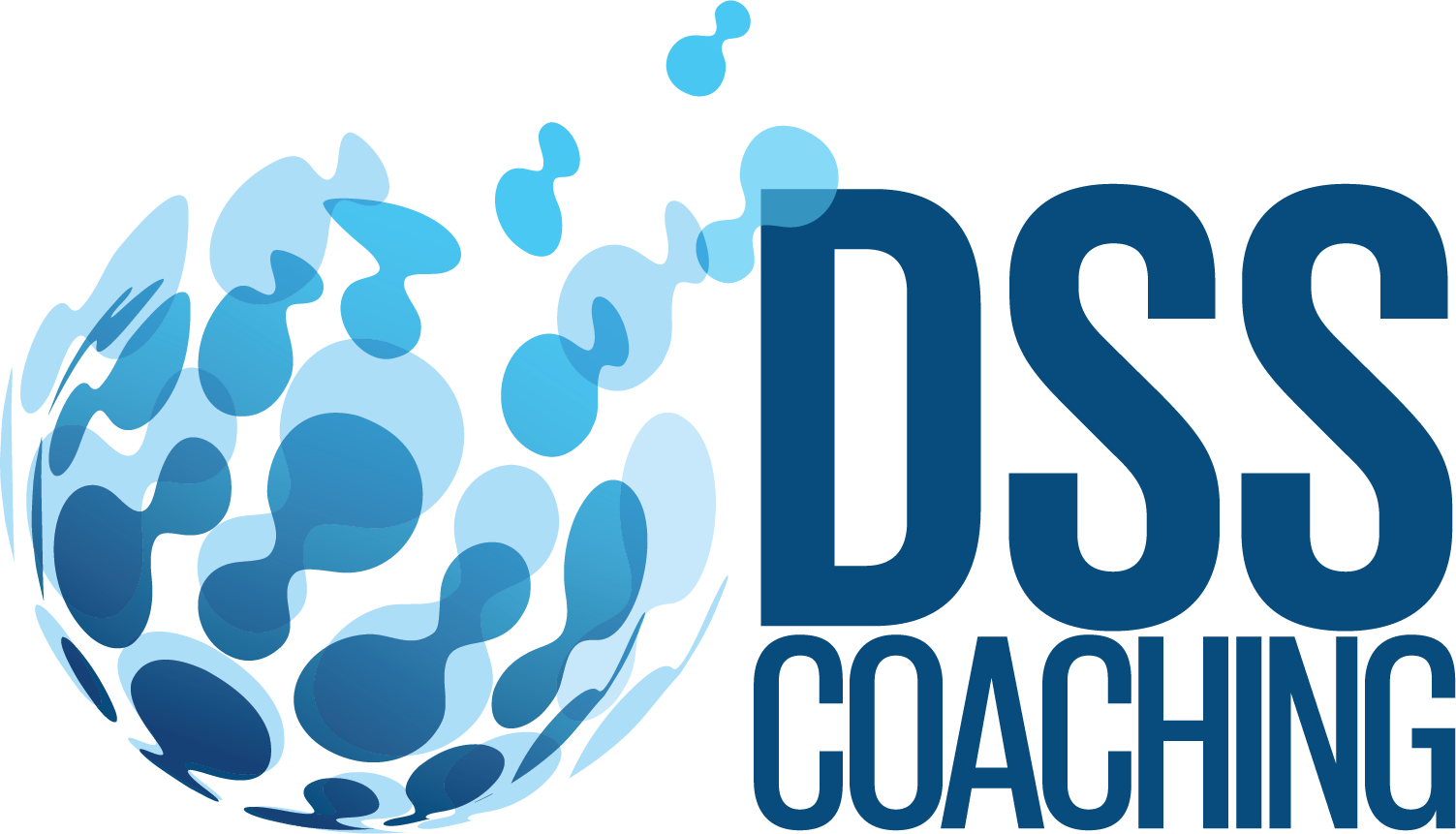

No Comments